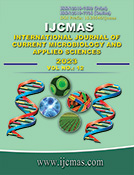


 National Academy of Agricultural Sciences (NAAS)
National Academy of Agricultural Sciences (NAAS)

|
PRINT ISSN : 2319-7692
Online ISSN : 2319-7706 Issues : 12 per year Publisher : Excellent Publishers Email : editorijcmas@gmail.com / submit@ijcmas.com Editor-in-chief: Dr.M.Prakash Index Copernicus ICV 2018: 95.39 NAAS RATING 2020: 5.38 |
Chronic exposure to inorganic arsenic (iAs) leads to development of cancer of various organs, most prevalent being skin cancer. iAs induces its carcinogenic potential by excess generation of free radicals, which induces DNA, protein, lipid damage; supresses activity of antioxidant enzymes; enhances prolonged inflammatory conditions and modulates TGF-β signalling cascade, all of which promote carcinogenesis. Black tea extract (BTE), a popular beverage and an established antioxidant, has been used in present study to combat the ill effects of iAs exposure. Present study has been conducted on normal human skin keratinocytes, HaCaT cells. Estimation of Reactive Oxygen Species (ROS) and Reactive Nitrogen Species (RNS) generation was done using 2’,7’-dichlorodihydrofluorescein diacetate (DCFH-DA) and Greiss reagent. Damage to DNA (by Micronuclei and Comet assay), protein (by protein carbonyl assay kit) and lipid (by lipid peroxidation) were assessed. Activity of antioxidant enzymes, inflammatory cytokines, p50 and p65 subunits of NF-κB were assessed using respective kits. Immunoblotting assay was performed to assess expression of TGF-β and modulation of its downstream signalling molecules. Results indicate that BTE quenches iAs induced free radicals; inhibits DNA, protein and lipid damage; prevents deactivation of antioxidant enzymes; suppresses inflammation and prevents EMT inducing modulation of TGF-β pathway, thus thwarting iAs induced carcinogenesis in HaCaT cells.
 |
 |
 |
 |
 |